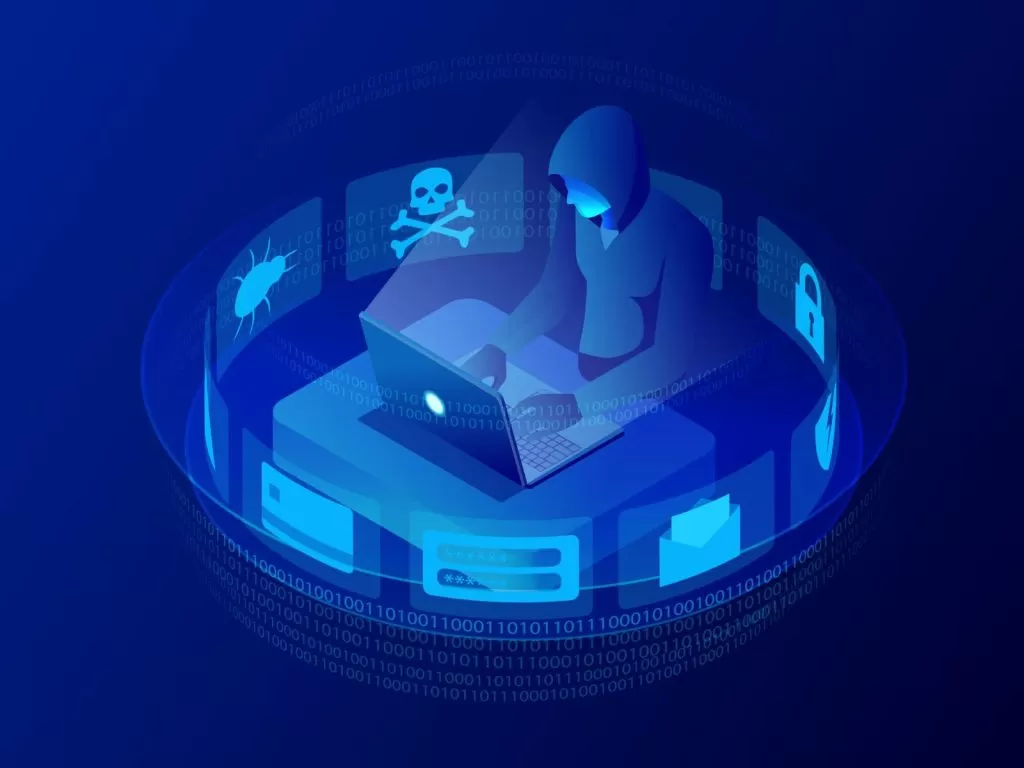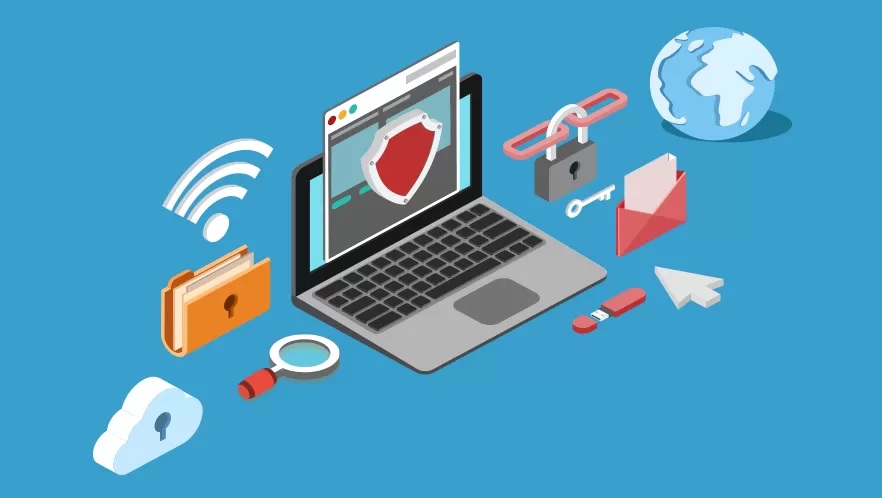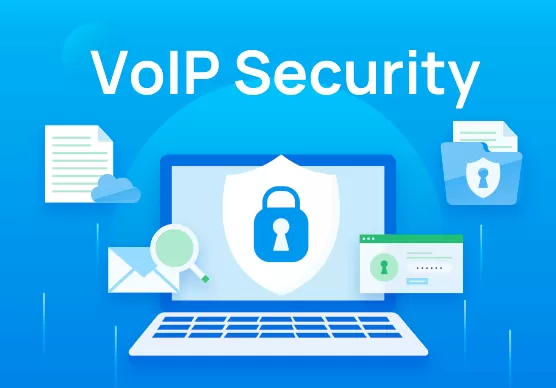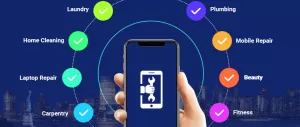Written By:
Scott McAuley
Scott is the IT Director of Texas Management Group, and has been in the IT industry for 25 years.
Did you know that VoIP phone systems are the preferred communication solution for over 50% of businesses in the United States?
With the increasing popularity of VoIP technology, ensuring the security of your VoIP system has become more crucial than ever before.
VoIP security is essential for protecting sensitive data, preventing costly security breaches, and maintaining your customers’ trust.
In this comprehensive guide, we will reveal the ten essential best practices that will help you master VoIP security and safeguard your communication infrastructure from emerging threats and vulnerabilities.
Key Takeaways
- Over 50% of U.S. businesses use VoIP, making its security crucial to protect sensitive data and prevent breaches.
- VoIP systems face risks like eavesdropping, toll fraud, and unauthorized access, requiring robust security measures to mitigate threats.
- Implement strong passwords, encrypt communications, enable two-factor authentication, and regularly update software to secure VoIP systems.
- Educate employees on recognizing VoIP security threats, such as phishing and social engineering, to enhance overall system security.
- Select VoIP providers with strong encryption, compliance with regulations, and robust security measures to ensure reliable and secure communication.
Table of Contents
What is VoIP, and How Secure is it?

In today’s digital world, Voice over Internet Protocol (VoIP) has revolutionized the way we communicate.
VoIP is a technology that enables voice and multimedia communication to be transmitted over the Internet, instead of traditional phone lines. With VoIP, users can make phone calls, send messages, and even conduct video conferences using the internet-based phone system.
But how secure is VoIP? While the convenience and cost-effectiveness of VoIP phones are undeniable, it’s important to address the potential security risks associated with this technology. As voice and data travel through the internet, they are exposed to various potential security vulnerabilities.
One of the main concerns in VoIP security is the interception of calls and eavesdropping.
Without proper security measures, it’s possible for malicious individuals to intercept and listen to sensitive conversations. Additionally, unauthorized VoIP traffic can lead to toll fraud, where unauthorized calls are made at the expense of the VoIP user.
To ensure secure VoIP communications, it is essential to implement robust security measures.
This can include encrypting voice data to protect it from unauthorized access, implementing toll fraud and intrusion prevention systems to block malicious activities, and using strong authentication methods to prevent unauthorized access to the VoIP system.
Furthermore, regular software updates should be applied to address any security vulnerabilities in the VoIP system. Employee training and awareness programs can also help educate users about the potential security risks and how to mitigate them.
By adopting these security practices, organizations can minimize the risk of data breaches and maintain the privacy and integrity of their communications.
| VoIP Security Risks | VoIP Security Measures |
|---|---|
| Eavesdropping on calls | Data encryption to protect privacy |
| Unauthorized access to VoIP systems | Strong authentication methods |
| Toll fraud | Regular software updates to address vulnerabilities |
| Malicious activities | Firewalls and intrusion prevention systems |
| Employee training and awareness programs |
Why Does VoIP Security Matter?

VoIP security plays a vital role in safeguarding the privacy and integrity of communication channels. As businesses and individuals increasingly rely on VoIP systems for their everyday communication needs, protecting sensitive information becomes paramount.
VoIP systems face various security challenges, including cyber threats and vulnerabilities. Without proper security measures, these systems are susceptible to eavesdropping, data breaches, and other cyber attacks.
The consequences of compromised VoIP security can be severe, leading to financial losses, damage to business reputation, and regulatory compliance issues.
One of the primary concerns in VoIP security is communication privacy. VoIP calls transmit sensitive information over networks, including customer data and confidential business conversations.
Without robust security measures, this sensitive information can be exposed to unauthorized parties, compromising privacy and confidentiality.
Regulatory compliance is another crucial aspect of VoIP security. Numerous industries, such as finance and healthcare, have specific regulations regarding the security and privacy of customer data. Failure to comply with these regulations can result in severe penalties and loss of customer trust.
Ensuring the security of your business phone system is not only about protecting sensitive information but also about maintaining customer trust and safeguarding business reputation. In today’s highly interconnected and digitally driven world, customers expect their data to be handled securely.
By implementing effective VoIP security measures, businesses can instill confidence in their customers and maintain their trust.
VoIP vs. Traditional Phones
When comparing VoIP systems with traditional telephony, it is essential to understand the advantages and differences between these two communication technologies.
Advantages of VoIP
- Cost Savings: VoIP offers significant cost savings compared to traditional phone systems, as it utilizes the internet for data transmission, eliminating the need for separate voice and data networks.
- Scalability: VoIP systems are highly scalable, allowing businesses to easily add or remove phone lines as their needs change, without the requirement for additional physical infrastructure.
- Flexibility: With VoIP, users can make calls from anywhere with an internet connection, providing flexibility and mobility for remote workers and businesses with multiple locations.
- Advanced Features: VoIP systems offer a wide range of advanced features, such as call forwarding, voicemail to email transcription, call recording, and video conferencing, enhancing communication efficiency and productivity.
- Quality of Service: VoIP technology has improved significantly over the years, offering high-quality voice and video calls that rival or exceed traditional phone systems in terms of call clarity and reliability.
- Reliability: VoIP systems can be highly reliable when implemented correctly, with redundancy and backup options available to ensure consistent communication even during power outages or network downtime.
VoIP Security Threats and How to Prevent Them

VoIP systems are vulnerable to various security threats that can compromise the confidentiality, availability, and integrity of communication.
Understanding these threats and implementing effective prevention measures is essential to ensure the security of VoIP systems.
Common VoIP Security Threats
Here are 10 of the most common VoIP security risks.
1. Enumeration and Credential Attacks
– Threat: Hackers try different usernames and passwords until they find ones that work, gaining unauthorized access to your VoIP system.
– Protection: Protect yourself by using strong, unique passwords that are hard to guess. Change your passwords regularly to reduce the risk of compromise. Additionally, enable features like two-factor authentication (2FA) to add an extra layer of security.
2. Denial of Service (DoS) Attacks
– Threat: Attackers flood your VoIP system with traffic, overwhelming it and causing it to slow down or become completely unusable.
– Protection: Protect your VoIP system by setting up firewalls and filters to block malicious traffic before it reaches your network. Keep your software updated with the latest security patches to fix vulnerabilities that attackers might exploit to launch DoS attacks.
3. Eavesdropping
– Threat: Eavesdroppers listen in on your VoIP calls or messages without your permission, potentially compromising the confidentiality of your communications.
– Protection: Safeguard your conversations by using encryption to scramble your calls and messages. Look for VoIP providers that offer strong encryption protocols like Secure Real-Time Transport Protocol (SRTP) or Transport Layer Security (TLS) to protect your communications from eavesdropping.
4. Man-in-the-Middle (MitM) Attacks
– Threat: Attackers intercept and modify your VoIP communications, allowing them to eavesdrop on your conversations, steal sensitive information, or impersonate you.
– Protection: Defend against MitM attacks by using encrypted connections to communicate with your VoIP system. Additionally, verify the identity of the people you’re communicating with to ensure you’re not inadvertently sharing sensitive information with a malicious actor. Trusted communication channels and digital certificates can help verify the authenticity of communication endpoints and protect against MitM attacks.
5. Phishing Attacks
– Threat: Scammers use deceptive emails, messages, or websites to trick you into revealing your login credentials, financial information, or other sensitive data.
– Protection: Protect yourself against phishing attacks by being cautious of unexpected communications asking for sensitive information. Avoid clicking on links or downloading attachments from unfamiliar or suspicious sources. Verify the legitimacy of requests for personal or financial information by contacting the sender directly through a trusted channel, such as their official website or customer support hotline.
6. Vishing (Voice Phishing) Attacks
– Threat: Scammers use phone calls to deceive you into revealing personal or financial information, posing as legitimate entities like banks, government agencies, or tech support representatives.
– Protection: Stay vigilant against vishing attacks by being skeptical of unsolicited calls requesting sensitive information or urging you to take immediate action. Be cautious of callers who pressure you to provide personal or financial information over the phone, especially if they claim to represent a trusted organization.
7. Malware and Viruses
– Threat: Malicious software infects your devices, compromising their security and potentially stealing sensitive information or disrupting your VoIP service.
– Protection: Defend against malware and viruses by installing reputable antivirus software on your devices and keeping it updated with the latest virus definitions and security patches. Avoid clicking on suspicious links or downloading files from unknown or untrustworthy sources, as they may contain malware. Regularly scan your devices for malware and perform security updates to minimize the risk of infection.
8. Call Hijacking
– Threat: Attackers take control of your VoIP calls, intercepting or manipulating them to eavesdrop on your conversations, impersonate you, or redirect your calls.
– Protection: Protect your calls from hijacking by using secure connections and encryption protocols like Secure Real-Time Transport Protocol (SRTP) or Transport Layer Security (TLS). Encryption ensures that your calls are encrypted end-to-end, preventing attackers from intercepting or tampering with your communication.
9. Unauthorized Access
– Threat: Attackers gain unauthorized access to your VoIP system, compromising its security and potentially causing damage, stealing sensitive information, or disrupting your services.
– Protection: Protect your VoIP system from unauthorized access by implementing strong authentication mechanisms, such as complex passwords, multi-factor authentication (MFA), or biometric authentication. Limit access to sensitive parts of your VoIP system to authorized users only and regularly review and update user permissions and access controls.
10. Social Engineering
– Threat: Attackers manipulate individuals into revealing sensitive information or performing actions that compromise security, such as disclosing passwords, clicking on malicious links, or transferring funds.
– Protection: Defend against social engineering attacks by educating yourself and your team about common social engineering tactics, such as phishing, pretexting, or baiting. Be cautious of unsolicited communications or requests for sensitive information, especially if they seem urgent or too good to be true.
10 Best Practices for VoIP Security

Ensuring the security of your VoIP system is of utmost importance to protect your communication channels and sensitive data.
By following these essential best practices, you can safeguard your VoIP system from potential VoIP security issues.
1. Use Strong Passwords
Choose passwords that are hard to guess and use a mix of letters, numbers, and special characters. Avoid common words or phrases.
2. Update Software Regularly
Keep your VoIP software up-to-date with the latest security patches and updates. This helps fix any known vulnerabilities that hackers could exploit.
3. Enable Two-Factor Authentication
Add an extra layer of security by requiring a second form of verification, like a text message code, when logging into your VoIP accounts.
4. Encrypt Your Calls and Messages
Encrypt your VoIP communications to scramble them and make them unreadable to anyone who might intercept them.
5. Limit Access to VoIP Systems
Only give access to VoIP systems to those who really need it. This reduces the chances of unauthorized users getting in.
6. Train Your Team
Educate your employees about the importance of VoIP security and teach them how to spot potential threats like phishing emails or suspicious calls.
7. Monitor Your Network
Keep an eye on your VoIP network traffic for any unusual activity or signs of an attack. Early detection can help prevent bigger problems.
8. Back-Up Your Data
Regularly back up your VoIP data so that you can recover it in case of a security breach or other disaster.
9. Use Firewalls and Security Software
Install firewalls and security software to protect your network from unauthorized access and malware. Additionally, you can also use a virtual private network or VPN to further encrypt your network.
10. Choose a Reliable VoIP Provider
Pick a reputable VoIP provider that prioritizes security and has a track record of keeping their systems safe from hackers.
Tips When Choosing a Secure VoIP Provider
Factors to Consider When Selecting a Secure VoIP Service Provider
When it comes to selecting a VoIP provider for your business, there are several key factors that you should consider to ensure the security and reliability of your VoIP system.
- Encryption Standards
- Look for providers that offer strong encryption protocols like SRTP (Secure Real-Time Transport Protocol) or TLS (Transport Layer Security) to protect your calls and data.
- Compliance Certifications
- Check if the provider complies with industry standards and regulations such as HIPAA (Health Insurance Portability and Accountability Act) or GDPR (General Data Protection Regulation) if applicable to your business.
- Network Security Measures
- Ensure the provider has robust network security measures in place, such as firewalls, intrusion detection/prevention systems, and regular security audits.
- Data Centers Security
- Verify that the provider’s data centers adhere to strict security standards, including physical security measures, access controls, and redundancy to prevent data breaches and downtime.
- Privacy Policies
- Review the provider’s privacy policies to understand how they handle and protect your data, including call recordings and personal information.
- Secure Authentication Methods
- Check if the provider offers secure authentication methods such as multi-factor authentication (MFA) to prevent unauthorized access to your VoIP services.
- Service Level Agreements (SLAs)
- Review the provider’s SLAs to ensure they guarantee a certain level of uptime, availability, and security for their services.
- Regular Updates and Patches
- Ensure the provider regularly updates and patches their systems to address security vulnerabilities and protect against emerging threats.
- Customer Support and Incident Response
- Evaluate the provider’s customer support and incident response capabilities to ensure they can promptly address security incidents and provide assistance when needed.
- Reputation and Reviews
- Research the provider’s reputation and read reviews from other customers to gauge their trustworthiness and reliability in terms of security and overall service quality.
By carefully considering these factors, you can make an informed decision when selecting a secure VoIP service provider that meets your specific requirements and safeguards your communication infrastructure.
Conclusion
In this article, we’ve explored the essential practices for securing VoIP systems, addressing threats like enumeration attacks, eavesdropping, and phishing. By implementing strong passwords, enabling encryption, and staying updated on software patches, users can bolster their defenses.
Selecting a reputable VoIP provider that prioritizes security is also crucial. With diligence and adherence to best practices, users can safeguard their communication infrastructure and maintain trust in an increasingly interconnected world.
Let’s remain vigilant in protecting the integrity, confidentiality, and availability of our VoIP systems, ensuring seamless communication without compromising security.
Thinking About Securing Your VoIP Setup?
Check out our blog collection for essential VoIP practices, and discover how our Managed Cybersecurity Services can keep your data and communications safe.
Protect your business today!
FAQ
What is VoIP in Security?
VoIP in security refers to the implementation of measures to protect Voice over Internet Protocol (VoIP) systems from cyber threats, ensuring the confidentiality, integrity, and availability of voice communications.
Are VoIP Numbers Secure?
VoIP numbers can be secure with proper security measures in place, such as encryption, authentication, and network security protocols. However, without adequate protection, VoIP numbers can be vulnerable to interception and exploitation by malicious actors.
What is the Primary Security Risk Associated With VoIP?
The primary security risk associated with VoIP is the interception of calls and eavesdropping. Without proper encryption and authentication measures, VoIP communications can be intercepted, compromising the confidentiality of sensitive information exchanged during calls.
How Does VoIP Affect Network Security?
VoIP can affect network security by introducing additional vulnerabilities and attack vectors into the network infrastructure.
Without proper security measures, VoIP systems can be targeted by various cyber threats, including denial of service (DoS) attacks, malware infections, and unauthorized access attempts, potentially compromising the overall security of the network.






